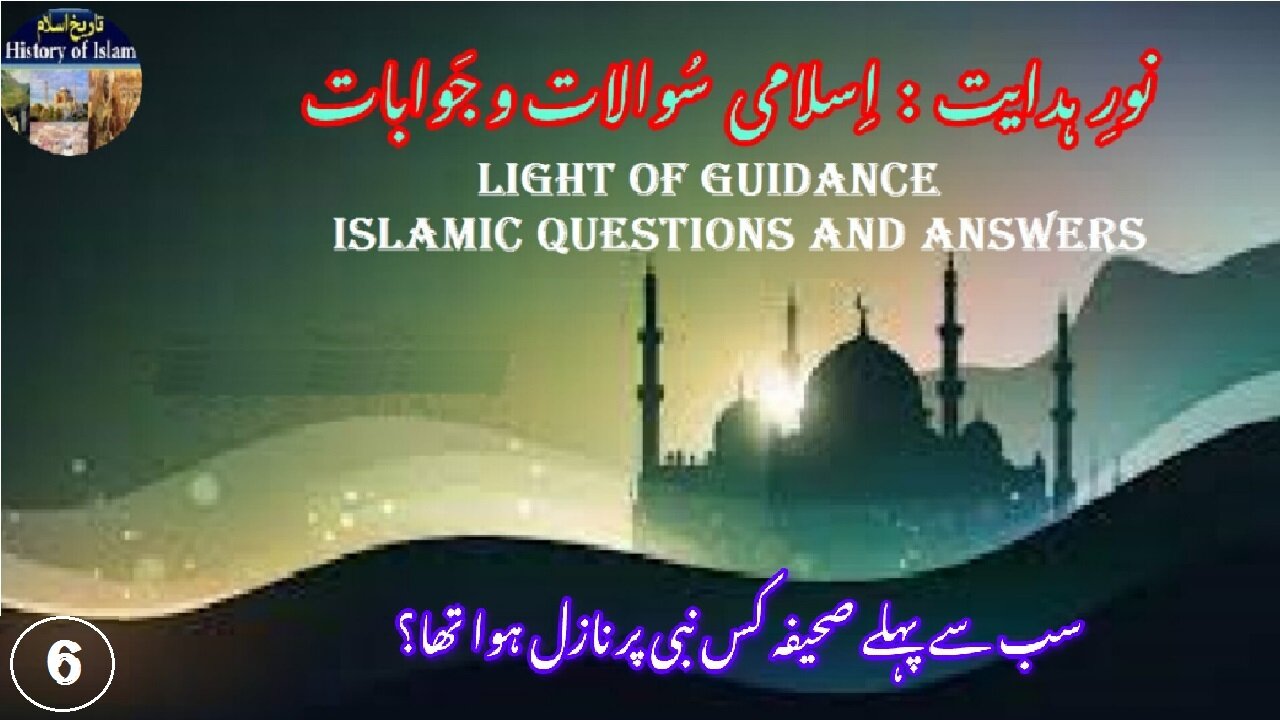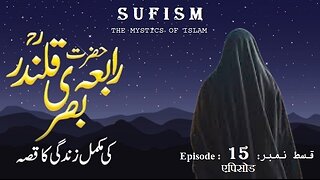Premium Only Content

To Which Prophet Was the First Scripture Revealed سب سے پہلے صحیفہ کس نبی پر نازل ہوا؟
@islamichistory813 #firstscripture #prophetidris #islamic #revelation #holybook #quranstory #islamicfacts #prophet #revelation #islamicknowledge #divinebook #islamicvideo #noorehidayat#islamisawalataurjawabat #dailyislamicquestions #quranandauthentichadith #islamicseries #islamicknowledgeurdu #lightofguidance #learnislamdaily #quranicwisdom #hadithlessons #islamicguidance #islamicawareness #seektruthinislam#program2025 #islamicmotivation
To Which Prophet Was the First Scripture Revealed?
Assalamu Alaikum wa Rahmatullahi wa Barakatuh, dear viewers.
Welcome to another enlightening episode of your daily Islamic series, “Noor-e-Hidayat: Islami Sawalat aur Jawabat.”
This is the program where we seek knowledge and clarity about Islam through authentic Quranic verses and Hadith.
Today’s important question is: To Which Prophet Was the First Scripture Revealed?
Revelation is one of the greatest blessings from Allah, through which He guides humanity and clarifies the purpose of life. Throughout history, Allah has sent many Prophets and Messengers, each carrying divine knowledge and laws suited to their time and people. But among them, who was the first Prophet to receive a divine scripture? The answer to this lies in the Holy Quran and Hadith, which clearly identify the first scripture ever revealed to mankind and the Prophet who received it.
According to Islamic belief, the first Prophet to receive a scripture was Prophet Idris, peace be upon him, known in the Bible as Enoch. He was one of the earliest Prophets after Prophet Adam and Prophet Shith (Seth), and Allah granted him a special book known as the Suhuf of Idris — meaning the Scrolls of Idris. This revelation contained wisdom, guidance, and moral principles for his people.
The Holy Quran confirms that Prophet Idris was a noble Prophet, honored with high rank and wisdom. In Surah Maryam, verse 56 and 57, Allah says, “And mention in the Book, Idris. Indeed, he was a man of truth and a Prophet. And We raised him to a high station.” These verses clearly establish his status as a Prophet who was distinguished among the early generations of mankind.
While the Quran does not provide detailed content of the scripture revealed to Prophet Idris, it affirms that Allah has revealed Suhuf (scrolls) to certain Prophets before the Torah, the Zabur, the Injil, and the Quran. In Surah Al-A’la, verse 18 and 19, Allah says, “Indeed, this is in the former scriptures, the scriptures of Abraham and Moses.” From this verse, scholars understand that there were divine scriptures even before Prophet Ibrahim and Prophet Musa, peace be upon them. The earliest of these was given to Prophet Idris.
Islamic scholars such as Imam Ibn Kathir and Imam al-Tabari mention in their writings that Prophet Idris was the first to be given a scripture and that he was the first to write with a pen. This is supported by a narration from Ibn Abbas, may Allah be pleased with him, who said that Allah revealed thirty scrolls (Suhuf) to Idris. These scrolls contained moral lessons, knowledge of the stars, timekeeping, and instructions for righteous living. Thus, Idris was not only a Prophet but also a scholar and reformer among his people.
The Prophet Muhammad, peace and blessings be upon him, also mentioned the Suhuf of earlier Prophets in Hadith. In Musnad Ahmad, Hadith number 21353, it is narrated that Abu Dharr, may Allah be pleased with him, asked the Messenger of Allah, “O Messenger of Allah, how many books did Allah reveal?” The Prophet replied, “One hundred and four. Allah revealed fifty scrolls to Shith, thirty scrolls to Idris, ten to Abraham, and the Torah, the Injil, the Zabur, and the Quran.” This Hadith clearly shows that Prophet Idris, peace be upon him, was among those chosen by Allah to receive a scripture before any other Prophet after Adam.
Prophet Idris lived in the generations following Prophet Adam and Prophet Shith. He was known for his deep knowledge, wisdom, and devotion to Allah. According to Islamic tradition, he called his people to worship the one true God, avoid wrongdoing, and live righteously. He taught about the afterlife and the importance of preparing for accountability before Allah. His scripture contained divine laws that guided humanity in early civilization.
Allah honored Prophet Idris with a high spiritual rank, as mentioned in Surah Maryam, verse 57, “And We raised him to a high station.” Scholars interpret this as both a literal and symbolic elevation — meaning Allah elevated him in dignity, wisdom, and possibly even physically, as some narrations mention that Idris was raised to the heavens.
The Suhuf of Idris are not present today, as they were lost with time, just like many other early scriptures. However, the wisdom and legacy of Idris continued through later Prophets, especially through the lineage of Prophet Noah and Prophet Abraham, peace be upon them. The later scriptures — the Torah to Musa, the Zabur to Dawud, the Injil to Isa, and finally the Quran to Muhammad, peace be upon them all — continued the same message of Tawheed (oneness of Allah), moral guidance, and justice that began with the Suhuf of Idris.
The Quran mentions in Surah An-Nisa, verse 163, “Indeed, We have revealed to you, as We revealed to Noah and the Prophets after him. And We revealed to Abraham, Ishmael, Isaac, Jacob, the descendants, Jesus, Job, Jonah, Aaron, and Solomon, and to David We gave the Zabur.” This verse shows the continuity of revelation — that Allah has been sending divine books from the earliest Prophets to the final Messenger, Prophet Muhammad, peace be upon him.
In conclusion, the first scripture revealed by Allah was given to Prophet Idris, peace be upon him, who was among the earliest Prophets after Adam. He received thirty scrolls containing divine wisdom and laws for his people. His name and mission are honored in the Quran as a man of truth, patience, and knowledge. His revelation laid the foundation for all later scriptures, leading to the final and complete book — the Holy Quran. As Allah says in Surah Al-Ahzab, verse 40, “Muhammad is not the father of any of your men, but he is the Messenger of Allah and the Seal of the Prophets.” The journey of divine revelation began with the Suhuf of Idris and was perfected with the glorious Quran, a timeless guide for all humanity.
We pray that Allah Almighty grants us the ability to act upon what we have learned today.
O Allah, increase us in knowledge, faith, and understanding.
O Allah, fill our hearts with Your light and make our deeds a means of Your pleasure. Ameen.
See you tomorrow, Insha’Allah, with another inspiring question and answer in “Noor-e-Hidayat.”
Until then, keep remembering Allah, for indeed, “In the remembrance of Allah do hearts find peace.”
Allah Hafiz
==================================
-
 8:15
8:15
ISLAMIC HISTORY
4 hours agoRabia Basri Episode No 15 The Saint of Divine Love” حضرت رابعہ بصری قسط 15 الہی محبت کا ولی
1 -
 LIVE
LIVE
Jeff Ahern
1 hour agoThe Saturday Show with Jeff Ahern
1,984 watching -
 9:47
9:47
MattMorseTV
1 day ago $71.38 earnedDemocrats CAUGHT in $15,000,000 LIE.
118K127 -
 1:47:55
1:47:55
Surviving The Survivor: #BestGuests in True Crime
1 day agoDan Markel Murder: Juror from Katie Magbanua's Trial Speaks Out for 1st Time
4.45K -
 18:03
18:03
stateofdaniel
1 day agoJen Psaki PANICS on Live TV, BACKPEDALS After Smearing Trump with Epstein—Fears LAWSUIT!
6.72K25 -
 18:31
18:31
Nikko Ortiz
1 day agoKaren You Need A Shower...
28.5K20 -
 1:09:52
1:09:52
VapinGamers
4 hours ago $6.94 earnedTools of the Trade - EP11 Highs and Lows of Streaming with Gothix - !rumbot !music
19K2 -
 LIVE
LIVE
SOLTEKGG
5 hours agoARC RADIDERS "First Month-Anniversary on Rumble"
119 watching -
 2:14:09
2:14:09
LFA TV
22 hours agoRUMBLE RUNDOWN WEEK 6 with JEREMY HERRELL AND SHAWN FARASH 11.15.25 9AM
170K7 -
 1:44:16
1:44:16
HotZone
7 hours ago $5.80 earnedLive: The Hidden Crisis in US Special Ops: What They’re Not Telling You About Women in Combat
19.6K19